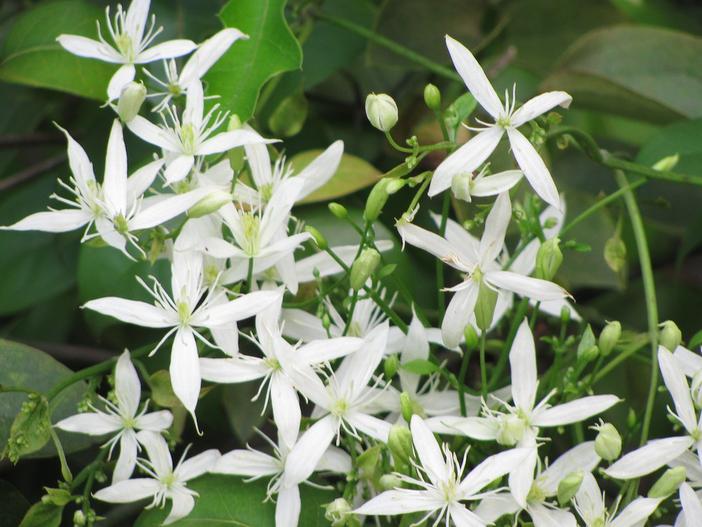Virgin’s Bower
(Clematis virginiana)
Virgin’s Bower (Clematis virginiana)
/
/

Malcolm Manners
CC BY 2.0
Image By:
Malcolm Manners
Recorded By:
Copyright:
CC BY 2.0
Copyright Notice:
Photo by: Malcolm Manners | License Type: CC BY 2.0 | License URL: https://creativecommons.org/licenses/by/2.0/ | Uploader: mmmavocado | Publisher: Flickr

























Estimated Native Range
Summary
Clematis virginiana, commonly known as Virgin’s Bower, is a deciduous vine native to a variety of habitats in North America, including forest edges, moist slopes, fence rows, thickets, and streambanks. Its native range extends from Newfoundland to southern Manitoba and down to the Gulf of Mexico. This species typically climbs with the aid of tendrils, reaching lengths of up to 12 feet (3.7 meters) and often draping over shrubs and fences. It produces clusters of small, white, fragrant flowers from late summer to early autumn, which are followed by decorative, plume-like seed heads that persist into winter.
Virgin’s Bower is valued for its ability to cover unsightly structures, its fragrant and showy flowers, and its adaptability to a wide range of soil conditions, from sandy to clay, and from dry to moist. It is suitable for USDA hardiness zones 3 to 8 and is available from many native plant nurseries as well as some specialty and large conventional nurseries. This vine is a larval host for the clematis clearwing moth, adding ecological value to the garden. In cultivation, it thrives in full sun to part shade and prefers soils with medium drainage. While it has a deep but sparse, fibrous root system that can make transplanting difficult, careful handling can mitigate this issue.CC BY-SA 4.0
Virgin’s Bower is valued for its ability to cover unsightly structures, its fragrant and showy flowers, and its adaptability to a wide range of soil conditions, from sandy to clay, and from dry to moist. It is suitable for USDA hardiness zones 3 to 8 and is available from many native plant nurseries as well as some specialty and large conventional nurseries. This vine is a larval host for the clematis clearwing moth, adding ecological value to the garden. In cultivation, it thrives in full sun to part shade and prefers soils with medium drainage. While it has a deep but sparse, fibrous root system that can make transplanting difficult, careful handling can mitigate this issue.CC BY-SA 4.0
Plant Description
- Plant Type: Vine
- Height: 10-20 feet
- Width: 3-6 feet
- Growth Rate: Slow
- Flower Color: White
- Flowering Season: Summer, Fall
- Leaf Retention: Deciduous
Growth Requirements
- Sun: Full Sun, Part Shade
- Water: Medium
- Drainage: Medium
Common Uses
Bee Garden, Bird Garden, Butterfly Garden, Deer Resistant, Drought Tolerant, Fragrant, Hummingbird Garden, Low Maintenance, Rabbit Resistant, Showy Flowers, Water Garden
Natural Habitat
Native to forest edges, moist slopes, fence rows, thickets, and streambanks in North America
Other Names
Common Names: devil’s hair, love vine, traveller’s joy, virgin’s bower, Virginia virgin’s bower, wild hops, woodbine
Scientific Names: , Clematis virginiana, Clematis virginiana var. virginiana, Clematis virginiana var. missouriensis, Clematis canadensis, Clematis missouriensis, Clematis bracteata, Clematis holosericea, Clematis virginiana var. bracteata, Clematis cordifolia
GBIF Accepted Name: Clematis virginiana L.